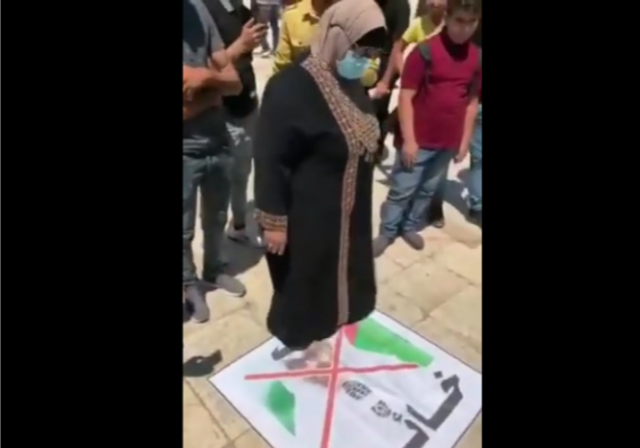Angered by Trump-Brokered Peace Deal, Palestinians on Temple Mount Set Fire to Portraits of UAE Leader

The rage over the peace agreement between between Israel and the United Arab Emirates spilled over to the second day as angry Palestinians burned posters of UAE Crown Prince Mohammed Bin Zayed, U.S. President Donald Trump, and Prime Minister Benjamin Netanyahu.
The angry mob, described by media outlets as Muslim ‘worshipers’ who had gathered for the Friday prayers on the Temple Mount, took out their rage on portraits of the UAE ruler, stamped and set fire to them amid chants of Allahu Akbar. “Palestinian worshipers tore up, trampled and set fire to images of Sheikh Mohammad bin Zayed, the crown prince of Abu Dhabi, as they protested in the compound of the al-Aqsa Mosque [the Temple Mount] in Jerusalem against the peace agreement,” the left-wing Israeli newspaper Haaretz reported.
The Times of Israel reported the “mounting anger by the Palestinians” over the U.S.-brokered peace deal:
Palestinians taking part in Friday prayers at the Al-Aqsa Mosque on the Temple Mount in Jerusalem trampled and then set fire to a poster of the United Arab emirates leader to protest the normalization deal announced Thursday between Israel and the UAE.
The worshipers took turns stamping on the poster of UAE de-facto ruler Mohammed bin Zayed Al Nahyan, in a sign of disrespect, while waving a Palestinian flag over it. They then tried to set the poster on fire.
The incident continued until Israeli policemen stepped in and took the poster away, while Palestinians chanted “Allahu Akbar.”
Palestinians also held protests against the deal in the West Bank and Gaza Strip.
In Nablus, in the northern West Bank, they burned posters of bin Zayed, US President Donald Trump and Prime Minister Benjamin Netanyahu.
In Gaza City, supporters of the Islamic Jihad terror group marched in protest, carrying signs that read: “Normalization is a treason” and “Palestine is not for sale”
The deal announced has been met with mounting anger by the Palestinians.
Palestinian protesters in East Jerusalem, Hamas-held Gaza, and the PLO-controlled Palestinian Territories, shared the sentiments of their leaders who were equally enraged at the peace agreement brokered by President Trump. The PLO-run Palestinian Authority, along with terrorist groups Hamas and the Islamic Jihad, rejected the deal, calling it a treachery and ‘stab in the back’ of Arabs and Muslims. The Palestinian Authority also recalled its ambassador to the UAE in protest.
Palestinian mobs outpouring their anger over peace deals are nothing new. In January 2020, enraged Palestinians took to streets after the details of the Trump peace plan became public. The U.S. had offered a $50 billion development fund sought to create millions of jobs for Arabs in the region. While Palestinian Authority President Mahmoud Abbas cut ties with the U.S. and Israel over the plan — let alone consider it, Palestinians rampaged in the streets burning U.S. flags and cut-outs of President Trump.
On Thursday, President Trump announced the historic agreement between Israel and the UAE that paves the way for the “full normalization of relations” between the two countries. While the deal was welcomed by many Arab states, including Egypt, Jordan, and Oman, the Palestinian leadership along with Iran and Turkey denounced it.
The Palestinian anger reflects their growing isolation in the region. One can’t blame the Arab Gulf states for turning their backs on the “Palestinian Cause.” The Palestinian leaders have brought it upon themselves by backing unpopular and sadistic regimes from Saddam Hussein’s Iraq to Mullahs of Iran.
As media reports suggest, encouraged by President Trump’s move other Arab states could reach an agreement with the Jewish State on similar lines. “Now that the ice has been broken I expect more Arab and Muslim countries will follow the United Arab Emirates,” President Trump said on Thursday while unveiling the deal.
“Palestinians denounce UAE-Israel peace agreement”
CLICK HERE FOR FULL VERSION OF THIS STORY